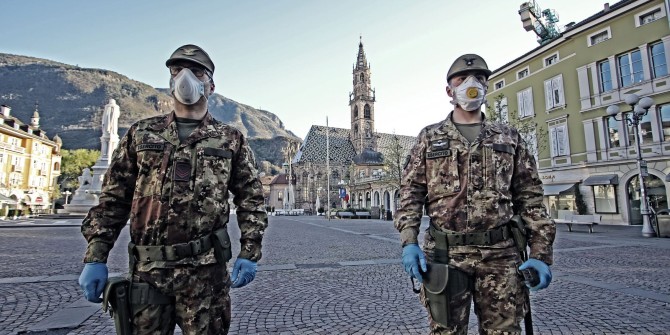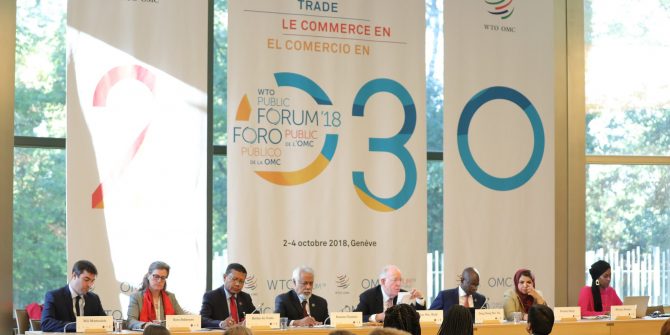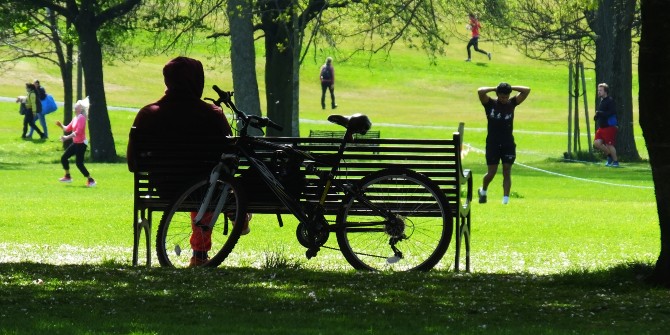A new emphasis on borders, unequal access to healthcare, condemned as ‘super-carriers’ – minorities have often experienced the pandemic very differently from the rest of society, writes Andrea Carlà (Institute for Minority Rights – Eurac Research). Nonetheless, in a few places special efforts have been made to help them.
The pandemic has sparked new insecurities for society at large – and more particularly for minorities, including migrants. The COVID-19 response has been a “politics of security – or rather, securitisation” (Nathan Alexander Sears 2020), in the sense that COVID-19 has been considered as an existential threat that requires exceptional measures. This is apparent in the war rhetoric used by many media, politicians and in public discourses. Interestingly, not only the virus has been securitised, but also some human activities like “circulation of persons and social contact” have become actions from which we should refrain (João Nunes 2020). Consequently, governments around the world have put in place, to a greater or lesser degree, emergency measures and restricted liberal freedoms and rights. A state of exception has been accepted, and with this type of development there is always the risk of authoritarian moves, as Viktor Orbán has done in Hungary.
For minorities, the pandemic itself and state responses to it raised many insecurities: personal, health, economic and social. Indeed, “when emergencies occur,” minorities are always “at risk of being excluded”. (Claire Thomas 2020). Theoretically COVID-19 is indiscriminate, since anybody can get sick and die. This encourages the belief that it is an egalitarian phenomenon. However, combined with existing inequalities and structural discrimination, the virus actually discriminated against populations at the margin. Furthermore, state responses in delivering healthcare and implementing lockdown also discriminated: not everyone could enjoy rights to the same degree. In reality, as Nunes points out, there is not “one single pandemic, but various experiences of the pandemic”, and some minorities have been disproportionately affected – especially vulnerable groups like the Roma population, migrant communities and undocumented migrants.
The UN High Commissioner for Human Rights and Public Health England point out that the virus has a higher death rate among minorities. For instance, in Brazil’s São Paulo state, people of colour are 62% more likely to die than white people, while the death rate is more than double for African Americans in the USA and higher for people of Bangladeshi Chinese, Indian, Pakistani, Other Asian, Caribbean and Other Black ethnicity in the UK.
There are several factors involved in this: marginalisation and discrimination in accessing healthcare, economic inequalities, overcrowded housing, jobs with higher risks (such as in transport and cleaning), prevalence of chronic conditions, but more research is necessary to identify specific causal relations.
Preventative measures like staying home were more problematic for some: for example, people who live in slums or camps, where hygienic conditions might be lacking, as is the case for many Roma people in Italy. Others may be homeless, as often happens to undocumented migrants. The pandemic and lockdown measures have sparked an economic crisis, but this particularly hit those working in the informal economy and domestic workers, since they did not just lose their income, but often did not have access to the welfare system. Roma, undocumented migrants and migrant communities tend to be more likely to be working in the informal sector. Digital education and home-schooling discriminated against children with disadvantaged backgrounds. According to a survey conducted by the Spanish NGO Fundación Secretariado Gitano (2020), almost a third of Roma students in Spain could not carry out learning tasks during the lockdown.
Not only was the virus securitised, but so were some minorities. The pandemic increased fear and the politics of fear. On the one hand, many populist politicians linked them to the spread of the disease; meanwhile, some governments looked for scapegoats for their failure in addressing the pandemic. Both trends were epitomised by US President Donald Trump and his references to the “Chinese” or “Kung Flu” virus. In consequence, there were many instances of racism and discrimination against people of Chinese origin in the USA, but also in Europe and Australia. These types of concerns have been raised also for Iranians.
Whereas in India Muslims were presented as super-carriers, in the USA Trump pointed to Latinos as vectors of the disease. In Europe, the Roma were often blamed for spreading the virus. Migrant communities were the target of this process of securitisation, because, as pointed out by researchers at GRITIM-UPF (2020), the pandemic overlapped with existing so-called “refugee crises” and existing anti-migrant stances. In this environment, COVID-19 has lent legitimacy to calls to restrict migration and prevent undocumented migration for public health reasons, increasing the risk of xenophobia and intolerance. This meant that in some countries, the narratives of state security and controlling migration were strengthened (GRITIM-UPF 2020). In Hungary and Greece, the government suspended the application process for asylum seekers. In the USA, undocumented migrants were returned without due process, invoking a previously unused public health statute (Florian Bieber 2020), while Trump’s executive orders suspended the issues of green cards in April and, more recently, working visas for migrants who present a risk for the US labour market and endanger the employment prospects of US citizens. In Germany, far-right political forces have linked the spread of the virus to immigration, while Italian social media circulated misinformation that non-EU migrants did not get sick.
The concept of border has also been securitised, in the sense that those on the other side is perceived as a threat, as carriers of COVID-19, and borders during the pandemic were seen mainly as a protective tool. All around the world, several border closures and travel restrictions were implemented – sometimes unilaterally, at others in agreement with neighbouring countries.
These steps were taken even though, as pointed out by Natalia Banulescu-Bogdan, Meghan Benton and Susan Fratzke (2020), closing the borders had “little chance of stopping” the spread of diseases and could instead have had “unintentional perverse outcomes,” for example taking attention away from more effective measures. The closures created problems not only for those who want to cross borders but also tensions in border areas, where national minorities often live. The pandemic also sparked attacks around some contested borders – as happened in the Italian province of South Tyrol, where some representatives of the German-speaking minority reinvigorated old claims for self-determination against the severe lockdown measures imposed by Rome.

Finally, the pandemic can be defined in terms of human security. This refers to the need to focus on the security of individuals rather than state security from military threats, and can be summarised in the slogan ‘Freedom from fear, freedom from want, and freedom to live with dignity’. As Akiko Fukushima (2020) argues, the COVID-19 pandemic “is a human security crisis” that deprived people of these freedoms. In particular, it revealed problems in national health systems (often due to cuts to public services and privatisation), and an economic problem of rising inequalities – problems that especially affect minorities and vulnerable groups.
In the longer term, the question is whether these developments, like the renewed emphasis on borders and migration control, will endure and become structural. However, alternative narratives and practices did spring up during the pandemic. For example, alongside border closures, there were various cases of international and cross-border cooperation, like the German Luftwaffe’s transport of COVID-19 patients from Italy, France, Lithuania and Kosovo to hospital in Germany, and the cooperation among South Tyrolean, Tyrolean and Austrian governments in acquiring medical protective equipment.
Some actions were taken to benefit the migrant population in light of the pandemic. For example, Portugal granted all migrants and asylum seekers (with pending applications for residency) temporary residency rights to give them access to social and health support. There was a re-evaluation of the value of some categories of migrants (GRITIM-UPF 2020), in particular those working in healthcare, as well as agricultural workers who were needed to guarantee food production during the lockdown. The UK government removed the NHS charge for non-EU doctors, nurses, and healthcare workers; Italy launched a process to regularise foreign workers in the domestic and agricultural sectors; and a South Tyrolean wine producer paid a private jet to bring seasonal workers from Romania.
So the pandemic could also be seen, as Daniele Conversi (2020) argues, as a stimulus for innovation and socio-political transformation. In particular, it might be an opportunity to address the problems that affect vulnerable minorities, since in a globalised world with transnational challenges (today COVID-19, yesterday climate change, tomorrow who knows) the security of the majority is unlikely if others – minorities and migrants – have none.
This post represents the views of the author and not those of the COVID-19 blog, nor LSE.





